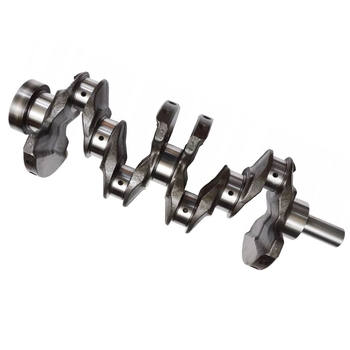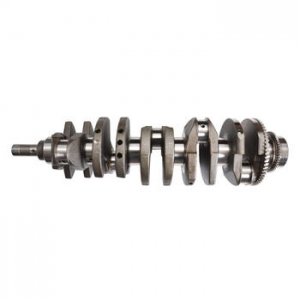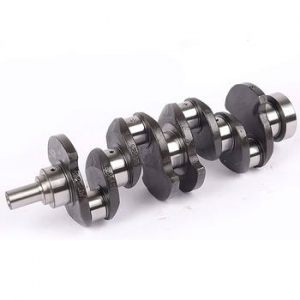First Section: Introduction
When it comes to upgrading your Toyota engine for better performance, choosing the right crankshaft is crucial. There are two main options for performance Toyota crankshafts: forged and billet. Both have their advantages and disadvantages, and it can be challenging to decide which one is best for your needs. In this article, we will compare forged and billet crankshafts and help you make an informed decision.
Subsection 1: What is a Crankshaft?
Before we dive into the differences between forged and billet crankshafts, it's essential to understand what a crankshaft is and what it does. The crankshaft is the heart of your engine. It converts the linear motion of the pistons into rotational motion, which drives the wheels of your vehicle. The crankshaft is made of steel and is designed to withstand the high stresses and forces generated by the engine.
Second Section: Forged Crankshafts
Forged crankshafts are made by heating a piece of steel and then hammering it into shape. This process creates a strong and durable crankshaft that can handle high loads and stresses. Forged crankshafts are commonly used in high-performance engines because they are more robust than cast crankshafts.
Subsection 2.1: Benefits of Forged Crankshafts
Forged crankshafts have several advantages over cast crankshafts:
In my experience, forged crankshafts are an excellent choice for high-performance engines that will be subjected to heavy use and high RPMs.
Subsection 2.2: Drawbacks of Forged Crankshafts
However, forged crankshafts are not without their drawbacks:
- They are more expensive than cast crankshafts.
- They may require additional machining to fit your specific engine.
- They may be more difficult to find than cast crankshafts.
Frankly speaking, if you're on a tight budget, a forged crankshaft may not be the best option for you.
Third Section: Billet Crankshafts
Billet crankshafts are made from a solid piece of steel that is machined to the desired shape. This process creates a crankshaft that is extremely strong and precise. Billet crankshafts are often used in racing engines because they can be customized to meet specific performance requirements.
Subsection 3.1: Benefits of Billet Crankshafts
Billet crankshafts have several advantages over forged crankshafts:
- They are more precise and can be customized to exact specifications.
- They are stronger than forged crankshafts because there are no imperfections or weak spots in the material.
- They can be made lighter than forged crankshafts, which can improve engine performance.
To be honest, if you're building a racing engine and need a crankshaft that can be customized to meet your specific performance requirements, a billet crankshaft is the way to go.
Subsection 3.2: Drawbacks of Billet Crankshafts
However, billet crankshafts are not without their drawbacks:
- They are significantly more expensive than forged crankshafts.
- They require more time and labor to manufacture, which can lead to longer wait times.
- They may not be necessary for most street-driven vehicles.
Interestingly enough, some people believe that billet crankshafts are overkill for most engines. However, if you're building a high-performance engine that will be subjected to extreme conditions, a billet crankshaft is an absolute necessity.
Fourth Section: How to Choose the Right Crankshaft
Choosing the right crankshaft for your engine upgrade can be a daunting task. Here are some factors to consider:
Subsection 4.1: Engine Type and Use
The type of engine and how it will be used are crucial factors in choosing the right crankshaft. Forged crankshafts are an excellent choice for high-performance street engines, while billet crankshafts are better suited for racing engines.
Subsection 4.2: Budget
Budget is also an essential factor to consider. Forged crankshafts are more expensive than cast crankshafts, while billet crankshafts are significantly more expensive than forged crankshafts. It's important to choose a crankshaft that fits within your budget while still meeting your performance requirements.
Subsection 4.3: Customization
If you need a crankshaft that can be customized to meet specific performance requirements, a billet crankshaft is the way to go. However, if you don't need customization, a forged crankshaft may be a better option.
Fifth Section: Conclusion
In conclusion, choosing the right performance Toyota crankshaft is crucial for your engine upgrade. Forged and billet crankshafts both have their advantages and disadvantages, and it's essential to consider your engine type, use, budget, and customization requirements when making your decision. By following the guidelines in this article, you can choose the right crankshaft for your needs and enjoy improved engine performance.
Sixth Section: FAQ
Q1: How much does a performance Toyota crankshaft cost?
The cost of a performance Toyota crankshaft varies depending on the type of crankshaft and the manufacturer. Forged crankshafts typically cost between $500 and $2000, while billet crankshafts can cost upwards of $5000.
Q2: How do I know if my engine needs a new crankshaft?
If your engine is experiencing symptoms such as knocking, excessive vibration, or low power output, it may be time to replace the crankshaft. It's important to consult with a qualified mechanic to determine the cause of the problem and whether a new crankshaft is necessary.
Q3: Can I install a performance Toyota crankshaft myself?
While it's possible to install a performance Toyota crankshaft yourself, it's recommended that you have it installed by a qualified mechanic. Installing a crankshaft requires specialized tools and expertise, and improper installation can cause engine damage.
Q4: What is the difference between a forged and a cast crankshaft?
Forged crankshafts are made by heating a piece of steel and then hammering it into shape. This process creates a strong and durable crankshaft that can handle high loads and stresses. Cast crankshafts are made by pouring molten metal into a mold. While cast crankshafts are less expensive than forged crankshafts, they are not as strong and may not be suitable for high-performance engines.
Q5: What is the difference between a forged and a billet crankshaft?
Forged crankshafts are made by heating a piece of steel and then hammering it into shape. Billet crankshafts are made from a solid piece of steel that is machined to the desired shape. Billet crankshafts are more precise and can be customized to meet specific performance requirements, while forged crankshafts are more affordable and suitable for most street-driven vehicles.




